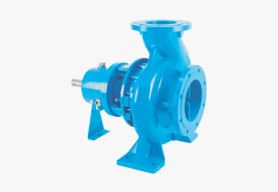ISO certificate
ISO 9001: 2015
CE Certificate
IMS IEC 2014/35EU
Msme Zed Bronze
Zero Defect Zero effect
A Guide on Centrifugal Pumps: Operation, Features, and Uses

What is a Centrifugal Pump?
A centrifugal pump is defined as a machine, which moves liquid by converting rotational energy from one or multiple impellers into fluid motion. In a centrifugal pump, an impeller receives fluid (incoming flow) through its central axis and pushes it outward by centrifugal force through the vanes of the paddle wheel. Fluid is discharged from the pump at a certain pressure and flow rate that is greater than the pressure and flow rate of the liquid entering the pump. The casing of the pump has fluid flow passages, which guide the fluid flow within the pump in such a way that prolongs its smooth operation while ensuring efficient performance.
How Does A Centrifugal Pump Work?
The impeller is an important component in the centrifugal pump. It consists of curved vanes; she is normally assembled between two companion discs for closed impellers. To accommodate liquids containing dirt, semi-open, and open impellers are available. The outflow of molten glass, which always contains suspended durable solid particles, requires an open impeller. Closed impellers are used when the liquid does not have sinkable particles. The casing can be of two main types: Volute Casing, the casing has a spiral shape increasing further away from the impeller and helps to increase the pressure of the discharged fluid.
- Diffuser Casing: The stationary blades surrounding the impeller dampen the fluid’s speed which increases pressure.
It is easier to tailor diffuser designs for certain applications which makes them more efficient.
Key Features of Centrifugal Pumps
The centrifugal pumps are part of a larger group of fluid transfer pumps and are different from positive displacement pumps. These pumps are ideal for transferring large amounts of low viscosity fluids. In certain industries, like chemical processing where the costs of maintenance are lower, up to 90% of the pumps being used are centrifugal ones.
Limitations of Centrifugal Pumps
Though the centrifugal pumps have plenty of advantages, they do possess some disadvantages as well:
- Not ideal for high-viscosity fluids: Higher-viscosity fluids reduce the efficacy of centrifugal pumps, which in turn require greater power to sustain flow rates.
- Prone to wear with slurries: It is easier for the pump to overheat and suffer from excessive wear if it is handling thick oils, mud, or other slurries.
- Shear-sensitive media concerns: Delicate emulsions, biological fluids, and other shear-sensitive liquids may get harmed with high impeller speeds.
- Requires priming: Unlike positive displacement pumps, the centrifugal pump has to be filled with fluid before use, it can’t self-prime.
- Variable flow with pressure changes: Such pumps will not meet specific flow rate if feed pressure varies which makes them not ideal for metering purposes.
Common Applications of Centrifuge Pumps
Centrifuge pumps are used stem the globe in the following sectors:
- Pumping and transferring City water system, irrigation system and HVAC systems, to name a few
- Chemical industry: Moving acids, bases and solvents
- Oil and gas: Movement of oils and other hydrocarbons with no or low viscosity.
- Industrial: Cooling fluid, food industry, and wastewater treatment.
Types of Centrifugal Pumps
There are several centrifugal pumps with distinct verticals, which include:
- Horizontal Centrifugal Pump: Designed to make installation and maintenance easy they are usually installed in industries and commercial areas.
- Vertical Centrifugal Pump: Has advantages of using smaller heights or needing to pump from deep wells.
- Single Stage: Are a good fit in applications that do not have higher pressure.
- Multi-stage: Suited for high-pressure needs since back-to-back impellers expand the range.
Conclusion
These are the most common pumping devices used everywhere in industrial and domestic applications because of their ease of operation, low cost, and ability to handle the low viscosity fluids. Centrifugal pumps Near Me and across industries are an important part of fluid management for water supply, chemical processing or oil transfer. However, positive displacement pumps are usually better suited for high viscosity fluids, slurries or precise metering applications.
With an understanding of the working principles, advantages, and disadvantages of centrifugal pumps, companies can make the right choice on which pump to buy for their requirements. Denwell Fluid Pumps has a wide range of industrial and commercial pumps for high quality and reliable centrifugal pumps.
